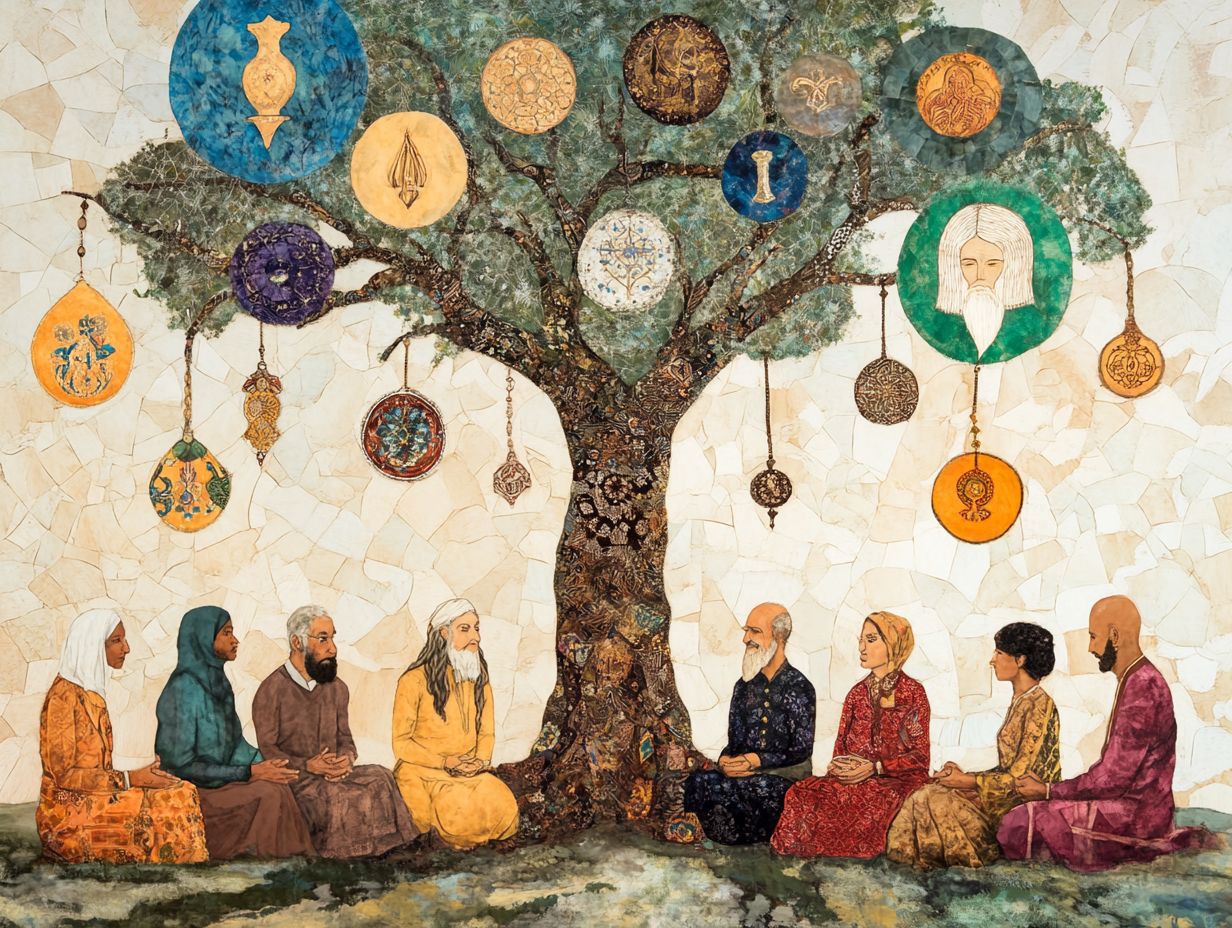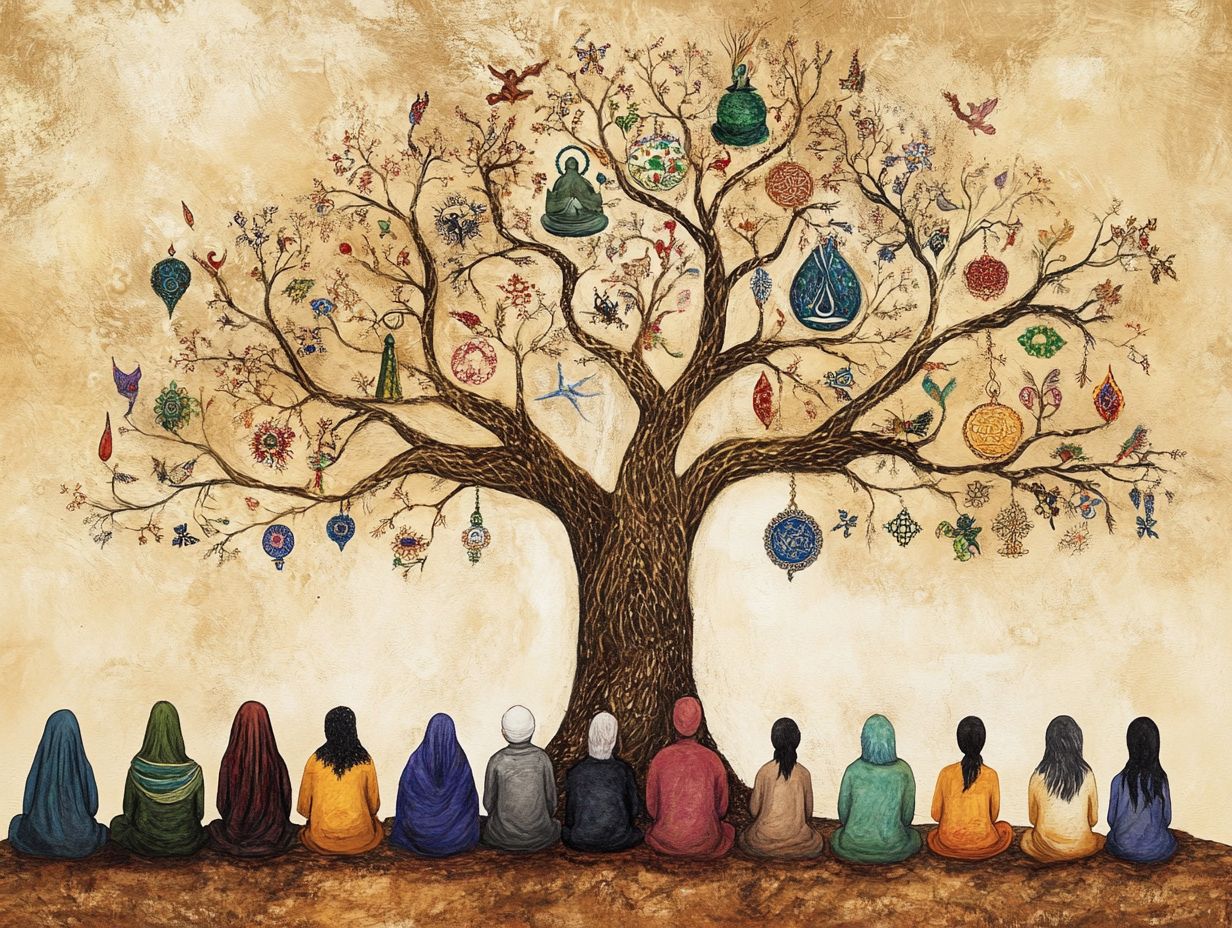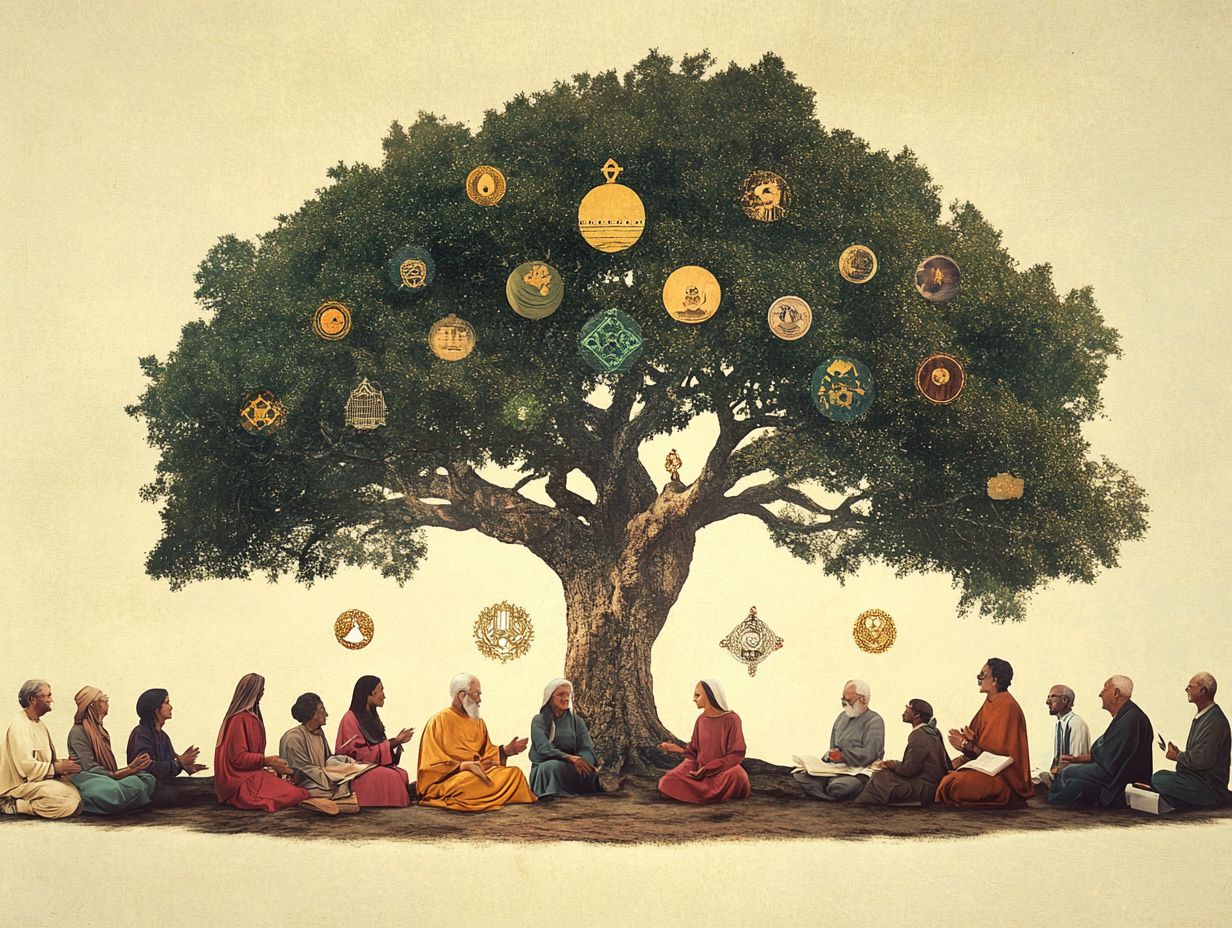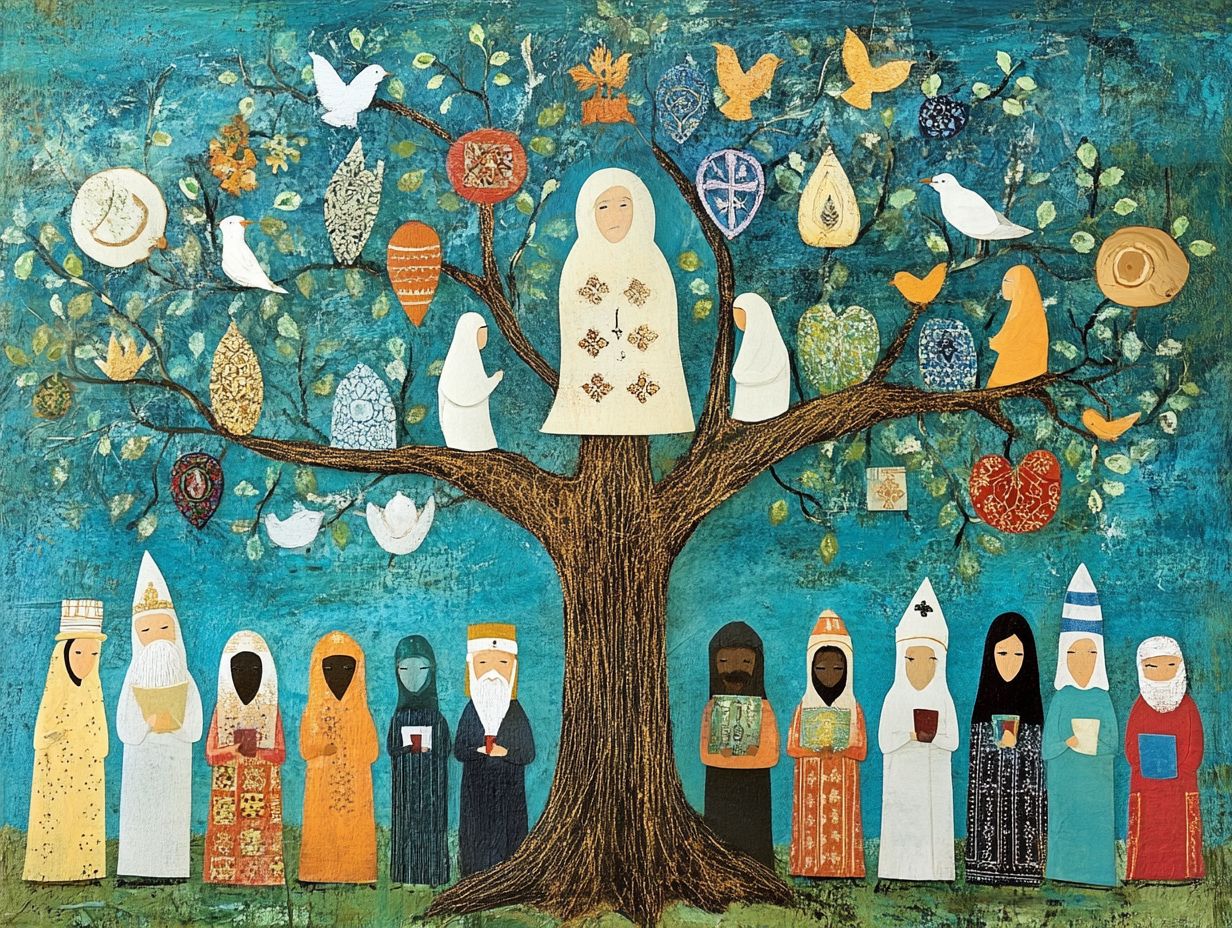Does Hinduism Accept Other Religions?
Hinduism, one of the oldest religions in the world, presents a rich tapestry of beliefs, practices, and philosophies that have evolved through millennia. This exploration delves into the core beliefs that define Hinduism, including the concepts of reincarnation, karma, dharma, and the quest for moksha.
Furthermore, it examines Hinduism s unique perspective on other religions, emphasizing principles of tolerance, acceptance, inclusivity, and the notion of a singular truth. These insights significantly influence interfaith dialogue and religious harmony, reflecting the inclusive nature of this vibrant faith.
What is Hinduism?

Hinduism stands as one of the world s oldest religions, intricately woven into the rich tapestry of Indian culture and philosophy. It embodies a vast array of beliefs, practices, and rituals that honor spiritual evolution and the pursuit of divine understanding. This ancient faith transcends mere religion; it represents a holistic way of life that underscores the significance of Dharma, or moral values, while instilling a deep reverence for sacred texts such as the Vedas, Upanishads, and the Bhagavad Gita.
Hinduism champions inclusivity and pluralism, embracing a multitude of pathways to the divine. It invites its followers to delve into their spirituality through an array of rituals and the worship of various Hindu deities, each reflecting the cultural richness and historical depth of this profound tradition. In essence, Hinduism is a celebration of diversity in belief and practice, fostering a connection to the sacred that is as enduring as it is expansive. This inclusiveness is evident in the acceptance of both polytheistic and monotheistic belief systems.
What are the Core Beliefs of Hinduism?
The core beliefs of Hinduism center on fundamental concepts such as Dharma (duty), Moksha (liberation), and the principles of Karma (action). Together, these elements form the moral and spiritual foundation of the faith, guiding adherents on their spiritual journeys toward enlightenment and unity with Brahman, the ultimate reality. They explore these spiritual beliefs through diverse rituals and practices that reflect their quest for spiritual freedom.
At the heart of this philosophy lies the belief in reincarnation, which underscores the notion that one’s actions in this life will shape future existences. This fosters a profound understanding of moral values and ethical teachings that echo throughout the diverse sects and denominations within Hinduism.
1. Reincarnation and Karma
Reincarnation and Karma stand as foundational concepts within Hinduism, where the intricate cycle of birth, death, and rebirth is profoundly influenced by one’s actions and ethical choices. This belief system establishes a framework of moral accountability that transcends a single lifetime, emphasizing the paramount importance of living with integrity and awareness. The karma amassed through actions in this life not only shapes the present but also dictates the circumstances of future incarnations.
These principles elucidate that every decision, no matter how seemingly trivial, can resonate with significant ramifications across lifetimes. Within this interconnected web of existence, individuals are urged to reflect on their behaviors and choices, nurturing a sense of responsibility and mindfulness in their daily interactions, fostering ethical living and moral principles.
For many, grasping the cyclical nature of existence ignites a deeper spirituality, inspiring individuals to pursue not only personal growth but also a sense of harmony within the broader community. As one navigates the complexities of life, the awareness of how their actions echo throughout time fosters a more compassionate approach to living, ultimately aspiring toward spiritual liberation from the relentless cycle of rebirth. This transformative experience leads to a deeper connection with humanity and the sacredness of life.
2. Dharma and Moksha
Dharma embodies the ethical duties and moral responsibilities intrinsic to Hinduism, serving as a guiding principle for individuals in their actions. In contrast, Moksha signifies the ultimate liberation from the cyclical nature of birth and rebirth, representing the pinnacle of spiritual growth and enlightenment. Together, these two concepts form a profound framework for leading a meaningful life, urging adherence to both personal and societal duties that align with one’s spiritual journey.
The exploration of Dharma compels believers to engage in righteous actions, fostering a sense of accountability not only to themselves but also to their community. In this regard, individuals are inspired to fulfill their societal roles, promoting harmony and the collective well-being of all. This moral guidance emphasizes the interconnectedness of ethical values and spiritual journey.
Simultaneously, the pursuit of Moksha motivates adherents to seek inner peace and self-realization, urging them to transcend material limitations. This dual focus enriches personal experiences while nurturing a supportive network of like-minded seekers who share similar spiritual aspirations. In this way, Hindu philosophy encourages a holistic balance between personal faith and communal harmony.
By intertwining ethical living with the quest for liberation, this journey harmonizes individual growth with community solidarity, creating a holistic approach to life and spirituality.
3. Polytheism and the Concept of Brahman
Polytheism in Hinduism embodies a belief system rich in diversity, recognizing multiple deities, each symbolizing distinct facets of the ultimate reality known as Brahman the formless and transcendent essence that underlies the universe. This intricate relationship enables devotees to engage in worship practices that resonate deeply with their personal experiences and spiritual aspirations, weaving a vibrant tapestry of divine manifestations and cultural richness in rituals. This approach to polytheistic beliefs illustrates the inclusivity and adaptability of Hindu spiritual beliefs.
Deities such as Vishnu, the preserver, and Shiva, the transformer, serve as prime examples of the principles encapsulated within Brahman, providing diverse pathways for individuals to forge a connection with the divine. In both temples and homes, worshippers often select specific deities to honor, guided by personal inclinations or familial traditions, and they partake in colorful festivals dedicated to these gods. This practice highlights the open-mindedness and religious symbols inherent in Hinduism.
This dynamic interplay not only fortifies individual spiritual journeys but also strengthens communal ties, as collective celebrations and rituals foster a profound sense of belonging and shared identity among diverse groups. Thus, the multifaceted nature of Hindu belief inherently promotes inclusivity, adaptability, and a deep respect for the myriad expressions of faith. This syncretism showcases the harmonious coexistence of different spiritual practices.
Does Hinduism Accept Other Religions?
Hinduism is distinguished by its remarkable acceptance of other religions, embodying principles of interfaith dialogue and religious tolerance that facilitate the harmonious coexistence of diverse beliefs and practices. This pluralistic approach not only recognizes the unique paths offered by various faiths but also cultivates an atmosphere of mutual respect and understanding. This religious acceptance fosters a community of shared values and universalism.
In doing so, it allows adherents to explore their spirituality unfettered by the constraints of dogma, promoting religious freedom and spiritual inquiry.
1. The Concept of “Ekam Sat” (One Truth)

The concept of ‘Ekam Sat,’ or ‘One Truth,’ encapsulates the essence of Hinduism’s embrace of diverse philosophies. It suggests that, although there are myriad paths to understanding the divine, they ultimately converge toward a singular reality that unites all beings. This principle illustrates the exquisite beauty of diversity within unity, underscoring the significance of compassion and respectful dialogue among various faiths. It also highlights the unifying and transcendent nature of divine truth.
By embracing ‘Ekam Sat,’ individuals embark on a transformative journey that nurtures interfaith relationships built on mutual respect and understanding. This philosophy inspires believers to seek commonalities rather than differences, fostering a sense of community that transcends individual convictions. This journey encourages open-mindedness and interreligious respect.
As spiritual seekers delve into the depths of their own traditions while simultaneously honoring others, they cultivate a richer, more inclusive narrative of truth. The insights gained from this perspective resonate profoundly, speaking not only to the quest for divine connection but also to the universal aspiration for harmony and coexistence among humanity. This faith exploration bridges gaps between different belief systems, fostering a deeper understanding.
In doing so, ‘Ekam Sat’ bridges gaps and nurtures a collective spiritual awakening, inviting all to partake in the shared journey toward enlightenment. This principle encourages a faith tradition that respects the sacredness of each path.
2. The Acceptance of Different Paths to God
Hinduism’s embrace of various paths to God embodies its fundamental belief in the richness of spiritual journeys, allowing individuals to connect with the divine through an array of rituals, practices, and philosophies that resonate with their unique experiences and cultural contexts. This inclusivity enables followers to honor their distinct paths while simultaneously recognizing their shared quest for spiritual truth and divine paths.
Such a multifaceted approach not only validates personal experiences but also weaves a vibrant tapestry of beliefs, where each path whether through devotion, meditation, or selfless service holds its own significance and potential for enlightenment. The teachings found in both ancient scriptures and modern interpretations emphasize that the essence of faith transcends mere adherence to dogma; it lies in the transformative power of personal encounters with the divine. This perspective promotes a pluralistic approach to spiritual freedom.
As practitioners traverse their spiritual landscapes, they are continually reminded of the importance of introspection and self-discovery. They embrace practices such as yoga and prayer, which cater to a wide array of needs and aspirations, ultimately nurturing a profound connection with the sacred. These sacred practices highlight the role of religious symbols and cultural exchange in personal faith.
3. The Influence of Other Religions on Hinduism
Hinduism has not existed in isolation; it has been influenced by and has influenced other religions through cultural exchange and religious inquiry. This syncretic nature has led to the incorporation of diverse spiritual practices and beliefs, contributing to its rich and varied tapestry. Hinduism’s resilience and adaptability demonstrate its open-mindedness and acceptance of different faith systems, further promoting religious coexistence and harmony.
The influence of various religions on Hinduism has created a rich tapestry of syncretism, characterized by cultural exchange and adaptation that have shaped a multitude of practices and beliefs. This dynamic tradition continues to evolve in response to changing societal contexts, showcasing Hinduism’s inherent flexibility and openness to new ideas while remaining anchored in its foundational principles. The Vedas, Upanishads, and the Bhagavad Gita are some of the sacred texts that reflect this evolution.
Throughout history, diverse religious traditions such as Buddhism, Jainism, and later Islam and Christianity have intermingled with Hindu practices, resulting in a unique blend of rituals and philosophical concepts. Beliefs related to karma and dharma have also been influenced by these interactions. For example, the incorporation of Buddhist motifs in temple architecture reflects an aesthetic symbiosis that transcends individual doctrines.
Similarly, the adoption of Sufi principles within Hindu devotional practices demonstrates a commitment to embracing diverse spiritual dimensions, enabling followers to explore broader realms of faith while remaining connected to their cultural identity. This intricate phenomenon not only enriches the spiritual landscape but also underscores the unifying potential of shared beliefs and values among different religious communities.
What is the Attitude of Hinduism towards Conversion and Religious Freedom?
Hinduism s perspective on conversion is intricate and differs among various sects and denominations, embodying a larger dialogue on religious freedom, spirituality, and the acceptance of diverse beliefs.
Certain factions champion the concept of “Ghar Wapsi,” or ‘homecoming,’ which encourages individuals to reconvert to Hinduism. However, the prevailing ethos within the tradition emphasizes respect and understanding for personal spiritual choices, fostering interfaith dialogue as a vital means to bridge differences and cultivate harmony among varied belief systems.
1. The Concept of “Ghar Wapsi” (Homecoming)
The concept of “Ghar Wapsi,” or ‘homecoming,’ embodies an initiative aimed at reconverting individuals to Hinduism, reflecting a deep-seated desire to reaffirm Hindu identity and strengthen community bonds. This practice seeks to embrace those who have converted to other faiths, fostering a sense of belonging within the Hindu community while promoting both tradition and spiritual inclusivity.
The implications of Ghar Wapsi transcend individual narratives to encompass broader cultural themes that shape the collective identity of Hindus. For many, this initiative signifies not merely a return to familiar rituals and values, but also a reconnection with a history that some perceive as having been overlooked. Through ceremonies and communal support, the process emphasizes a reaffirmation of faith, striving to heal divisions and reinforce a shared heritage. It also brings to light the importance of rituals and traditions in maintaining cultural continuity.
While it conveys a message of hospitality and acceptance, it simultaneously ignites discussions surrounding identity, societal acceptance, and the delicate balance between faith and belonging in an increasingly pluralistic society.
2. The Role of Hinduism in Interfaith Dialogue
Hinduism holds a pivotal role in nurturing interfaith dialogue, underscoring principles of respect, understanding, and communal harmony that facilitate constructive conversations among diverse religious groups. This proactive engagement not only fosters acceptance of varying beliefs but also encourages collaborative efforts toward shared social goals and spiritual growth.
Through these dialogues, adherents of Hinduism cultivate empathy and appreciation for the values upheld by other faiths, creating a nurturing environment where differences are not merely tolerated but genuinely embraced. These efforts highlight Hinduism’s commitment to religious coexistence.
Such interactions dismantle stereotypes and prejudices, paving the way for a more inclusive society that celebrates diversity.
By prioritizing mutual respect and open communication, Hindu teachings inspire individuals to seek common ground, fostering cooperation that transforms local communities.
Ultimately, this unwavering commitment to interfaith dialogue reflects a broader vision of unity, wherein collective efforts strengthen peace and understanding among all individuals, regardless of their diverse spiritual journeys.
3. The Views of Different Hindu Sects on Conversion

Different Hindu sects present a spectrum of opinions on the topic of conversion, with some advocating for a more inclusive approach while others exhibit skepticism. This spectrum reflects the pluralistic approach within Hinduism. This diversity of thought is a testament to the intricate tapestry of Hinduism, which seeks to balance the preservation of its identity with the welcoming of new adherents through acceptance.
For instance, certain sects emphasize the significance of personal experience and inner transformation, positing that true spirituality transcends rigid doctrines and embraces anyone in pursuit of a deeper connection with the divine. Conversely, some groups hold steadfast to traditional practices and teachings, often viewing conversion as a potential compromise of their fundamental beliefs rooted in Hindu philosophy.
This ongoing discourse surrounding conversion not only underscores the inclusivity championed by certain advocates but also serves as a reminder of the cultural roots and histories that have shaped the faith of its followers. It underscores the role of rituals and practices in maintaining Hindu traditions.
Ultimately, this negotiation of beliefs reflects an evolving landscape in which various sects endeavor to foster understanding while remaining faithful to their foundational principles. This dynamic reflects the ongoing quest for spiritual freedom and personal faith.
How Do Hindus View Other Religions?
Hindus typically approach other religions with a profound sense of tolerance and respect, acknowledging the validity of diverse faiths and the importance they carry within the rich tapestry of human experience. This attitude reflects the universalism inherent in Hindu teachings.
This perspective is deeply ingrained in the understanding that various religious traditions can coexist harmoniously, enriching a pluralistic society that promotes understanding and compassion among its members. This underscores the importance of interreligious respect and acceptance.
1. Tolerance and Respect for Other Faiths
Tolerance and respect for other faiths stand as fundamental principles within Hindu philosophy, advocating for understanding and acceptance that transcend religious boundaries, thereby nurturing an environment in which diverse beliefs can flourish. This inclusive perspective fosters interfaith dialogue, enhancing communal harmony and enriching the spiritual landscape.
In this context, practitioners often engage in meaningful conversations with followers of various religions, highlighting shared values rather than fixating solely on their differences. These interactions extend beyond mere tolerance; they are anchored in a profound appreciation for the myriad paths to spiritual realization and enlightenment.
Hinduism, through its sacred texts and teachings, encourages devotees to recognize the divine presence in everyone, fostering a sense of unity that transcends specific rituals or doctrines.
As communities embrace the celebration of their differences, they simultaneously cultivate deeper connections with one another, paving the way for enduring peace and mutual respect in an increasingly diverse world. This embodies the mysticism and divine truth found in Hindu teachings.
2. The Importance of Unity and Harmony
The importance of unity and harmony within Hinduism highlights the belief that diverse religious traditions can coexist peacefully, creating a rich tapestry of communal integration that celebrates both cultural and spiritual diversity. This ethos not only enhances social cohesion but also cultivates an environment conducive to mutual respect and understanding.
It underscores the interconnectedness of all beings, urging individuals to embrace their differences while seeking common ground through shared values and spiritual practices. This interconnectedness reflects the Hindu concepts of Brahman and Atman.
This framework facilitates conflict resolution and promotes dialogue, fostering a harmonious society in which individuals from various backgrounds can flourish together. It emphasizes the sacredness of life and the importance of ethical living.
By nurturing compassion, tolerance, and acceptance, Hindu teachings advocate for a collective journey toward enlightenment, demonstrating how unity can translate into collective strength. In a world often fraught with divisions, these principles emerge as essential tools for peacebuilding and coexistence, inspiring communities to appreciate their unique identities while collaboratively striving toward a common purpose. This approach nurtures faith exploration and the quest for meaning.
3. The Role of Hinduism in Promoting Religious Pluralism
Hinduism plays a crucial role in fostering religious pluralism, embracing a multitude of spiritual paths and beliefs as fundamental to its tradition. This inclusive approach creates an environment where spiritual diversity can thrive, acknowledging the legitimacy of various faiths while emphasizing the shared values that unite humanity. This inclusive nature celebrates the diversity of polytheistic beliefs and monotheism within Hinduism.
Within this intricate tapestry, Hinduism nurtures a profound respect for individual spiritual journeys, recognizing that each person’s pursuit of truth and enlightenment may unfold in distinctive ways. This respect for diverse paths is a testament to Hinduism’s open-mindedness and religious acceptance.
Rituals, festivals, and philosophical teachings mirror this celebration of diversity, providing platforms for dialogue and understanding among different communities. The practice of meditation and the acknowledgment of various paths to God are examples of this inclusivity.
By honoring a vast array of deities and beliefs, Hinduism cultivates a climate in which differences are not simply tolerated but genuinely cherished. This multifaceted approach to worship underscores the sacredness of religious symbols and sacred space.
This expansive practice not only enriches the Hindu experience but also reinforces the significance of coexistence, illustrating how spiritual diversity can enhance a more harmonious and interconnected society. The celebration of cultural exchange and the embrace of personal faith highlight this inclusivity.
Frequently Asked Questions
1. Does Hinduism accept other religions?

Yes, Hinduism is known for its acceptance of other religions, promoting a spirit of religious tolerance and pluralism. This acceptance is deeply rooted in the principles of Hindu philosophy, which acknowledge that there are multiple paths to the same divine truth.
Yes, Hinduism is known for its inclusivity, acceptance, and tolerance of other religions. It recognizes that there are many paths to the divine, embracing pluralism and diversity in beliefs and practices rooted in the Vedas, Upanishads, and Bhagavad Gita.
2. Is Hinduism an exclusive religion?
No, Hinduism is not an exclusive religion. It embraces a pluralistic approach and does not claim to be the only path to salvation, acknowledging the validity of other faith traditions and paths to God.
3. Are followers of other religions allowed to visit Hindu temples?
Yes, Hindu temples, considered sacred spaces, are open to all, regardless of their religious beliefs. In fact, many Hindu temples welcome and encourage non-Hindus to visit, fostering interfaith dialogue and religious coexistence to learn about the faith.
4. Does Hinduism promote conversion to its faith?
No, Hinduism does not actively promote conversion. It believes in spiritual freedom and that each individual has their own spiritual journey, encouraging people to follow their own path while respecting other belief systems and religious identities.
5. Are there any restrictions for interfaith marriages in Hinduism?
Hinduism does not have any restrictions for interfaith marriages. However, it is important for both partners to respect and understand each other’s beliefs, fostering religious harmony and coexistence to have a harmonious relationship.
6. Can someone be both Hindu and follow another religion?
Yes, someone can identify as Hindu and also follow another religion. Hinduism, known for its inclusivity and open-mindedness, does not have a strict definition of who can be considered a Hindu, allowing for syncretism and the incorporation of beliefs from other religions into their practice, thus fostering a spiritual journey enriched by multiple faith systems.
